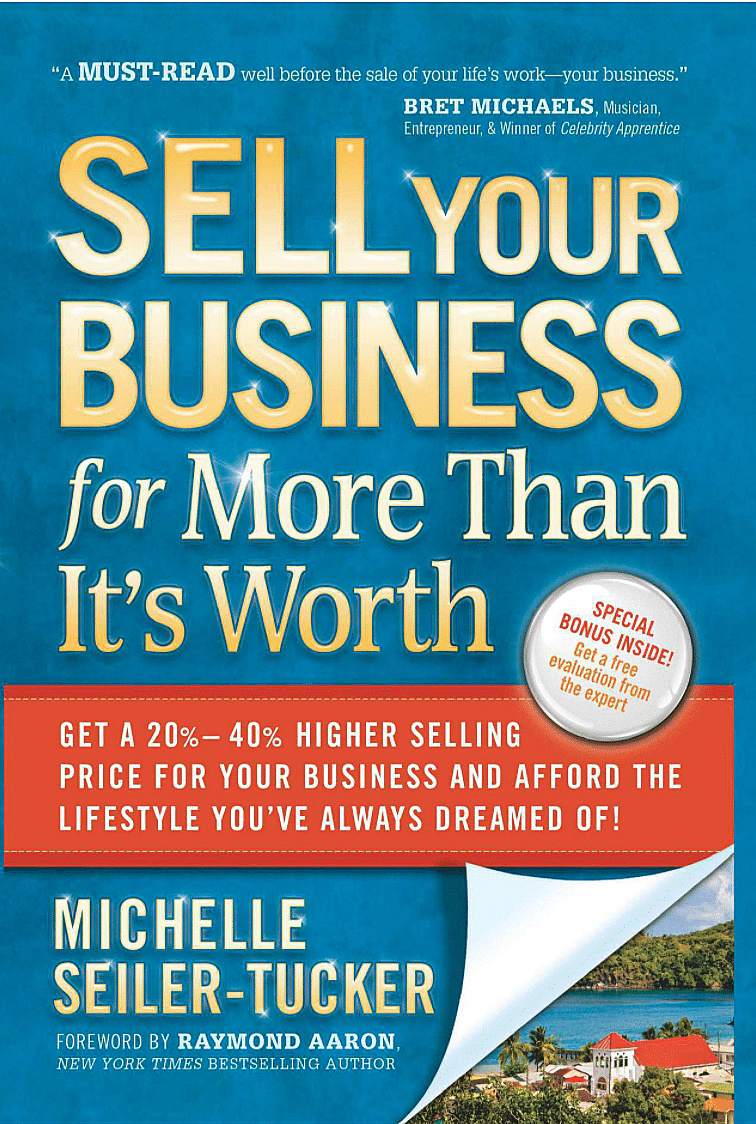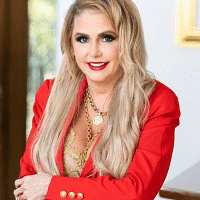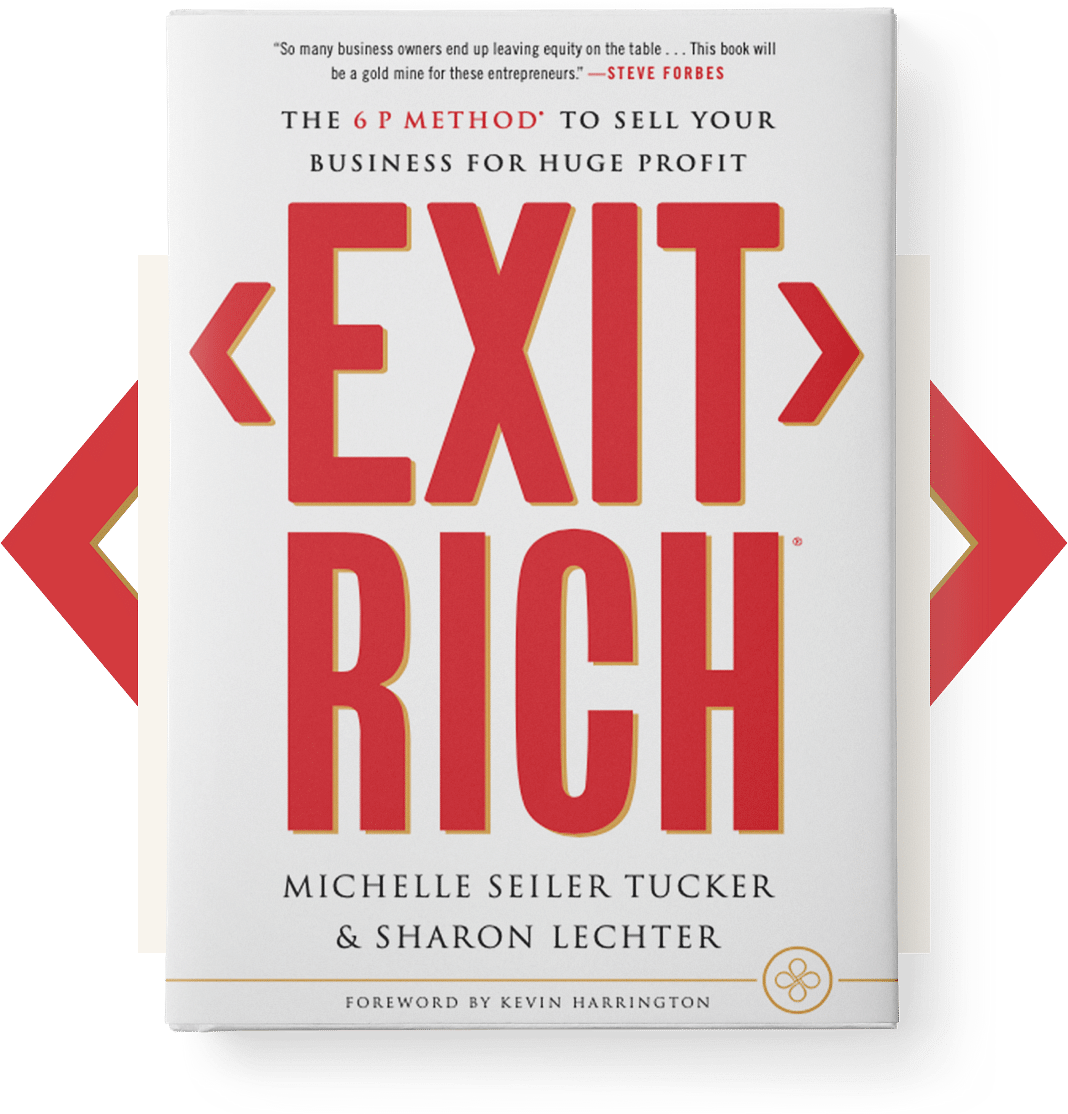
How to Exit Rich? M&A expert and author Michelle Seiler Tucker on the 6Ps of selling your business
By Jim James, Founder EASTWEST PR and Host of The UnNoticed Entrepreneur.
In the recent episode of The UnNoticed Entrepreneur, Michelle Seiler Tucker talked about how she, as a mergers and acquisitions (M&A) expert and author of the book “Exit Rich,” helps businesses get noticed.
Image from LinkedIn
The Challenge of Helping Businesses for Sale
For Michelle, there are many steps before the businesses she helps get noticed. They help prepare and package the business for sale. They work with business owners to make sure that they’re building their business with the proper infrastructure, which is what they call the 6P’s.
As far as getting noticed is concerned, she pointed out that it’s as difficult as the slippery slope. Most business owners don’t want to be noticed when they’re selling. There are confidentialities. They don’t want their employees, clients, vendors, landlords, and everyone that they do business with to know that they’re for sale or they’re on the market.
Before she talked on the podcast, she had a very nervous seller. They don’t want their investors, clients, and anyone to know. So it’s about not getting that business owner noticed because that can ruin your business if you breach confidentiality.
People don’t like change. Employees don’t want to know that the owner is selling because they’re fearful that they’re going to lose their job; that the new owner is going to take away certain benefits, change pay, or be difficult to work for. Clients think that they know who’s going to come in and expect to not provide the same level of quality customer service.
It’s usually a best-kept secret that a business is selling their business. This is why it’s really difficult.
Michelle and her company, Seiler Tucker, never showcase businesses with proprietary information. They always go to the market without any proprietary details, without anything that will give it away. They’re extremely cautious because if they breach confidentiality and employees and customers later find out that it’s for sale, then they could literally put them out of business.
It’s a very difficult process but they get businesses noticed without anyone knowing the company name, address, or anything proprietary about that business. They do that through blind mailings, telemarketing, and business site listings. They send out blind teasers to gauge interest and someone’s appetite — to see if they have the interest to sign a nondisclosure agreement, go through the financial qualifying process, and move on to get more information to find out who that business is.
In the beginning, they get that business listed and known without breaching confidentiality, which is not easy.
On Transparency
There’s this assumption that everyone wants to get noticed. But there are times, especially if you have a listed company, that are quiet periods as well. In this case, how does Michelle help companies prepare to be seen and look attractive?

Image from Unsplash
A lot of business owners don’t really know who to call or hire when they go to sell their business. Some of them will hire a real estate agent, which is something that you should never do because of their model: The more you tell, the more you sell. They stick a big sign in front of your yard, put it on Multiple Listing Service, and conduct open houses. Everybody would know about it.
You want to make sure that you hire an M&A expert because they maintain confidentiality throughout the process.
In the case of her business, Michelle shared that they try not to cover anything up. They want to tell the truth and be transparent about the good, the bad, and the ugly. They want to talk about the skeletons in the closet upfront.
Michelle and company really want to work with business owners because they want to clean up things. For example, there could be a pending lawsuit, a workers’ compensation issue, or some employment scandal. They want to try to clean all that up before they go to market. They want to tell a story about what did happen — not what’s happening today. Their goal is to package up the business in the best light and do that with full transparency.
She compared it to staging a house. When you put your house on the market, a real estate agent will come in. If it’s a really good real estate agent, they will work staging your house or stage it themselves and really show your house in the best possible light. They get rid of the clutter and the junk and make it look like you have no kids.
For businesses, this depends upon the size of the business.
If it’s a small retail business like a coffee shop, restaurant, or clothing store, they’d want to really dress up the curb appeal. They want to make sure that the signage is visible, that the windows are cleaned up further. If it’s a large business like a manufacturing plant or a trucking company, they’d want to make sure that the business looks as good as it possibly can in the standard of a warehouse or a trucking facility. They’d also work with the owner to dress up the staff and make sure that they’re in proper attire and that they look good. They make sure that everything is clean and looks good on the outside.
On the inside, they also work with the business owner to clean up the 6P’s. They help make sure that they have the right people in the right seats, that they have management teams in place.
Steve Forbes, who endorsed her book “Exit Rich,” pointed out that 80% of businesses will never sell. M&A Source in America, on the other hand, said that 90% will never sell. This means that you have a 10 to 20% chance of success. If Michelle and her team don’t work with you on the inside and out, the probability of you selling your business is slim to none.
This is why they want to dress up those 6P’s and build that infrastructure to make sure that your business is shown in the best light possible. They have a road to Exit Rich program. They work with their clients one to three years before the business is put on the market, because this thing takes time. You didn’t go to business overnight and it can’t be fixed overnight as well.
The 6P’s of Selling a Business
Michelle discussed the 6P’s in the Exit Rich book, which she authored with Sharon Lechter (who is the co-author of “Rich Dad, Poor Dad”).
Image from Exit Rich website
-
People. The number one reason that businesses aren’t sellable is that business owners don’t find their exit. They wake up and they go, “I can’t do this anymore. I have to sell my company.” It can be because of health issues, partner disputes, or divorce. It could be because of the pandemic or the employee market and not wanting to deal with employees anymore. But you can’t wake up one day and expect that you’re going to maximise value. It never happens that way.
You have to plan your exit from the beginning. Like Stephen Corvey says, start with the end in mind. The number one reason that business owners don’t sell is that a business is 1,000% dependent on that owner. You want to make sure that you have the right people in the right seats. You want to ask the “who” questions: Who opens the doors? Who runs customer service? Who runs quality control, marketing, legal, and accounting? Who handles manufacturing, distribution, et cetera? And your name should never be next to that “who” in your company. You want the business to run without you.
-
Product. In America, it was the startups that used to have a great risk. About 90% of startups would run out of business during the first one to five years. But it’s not the case anymore. Out of 27.6 million businesses in the US, 70% of those businesses go out of business after they’ve been in the business for 10 years or longer.
Think about your product, industry, and service. You have to ask yourself: Are you at the top of your game? Are you an amazon and you’re in your prime? Are you a blockbuster and are about to go out of business? The number one reason businesses are going out of business around the world and are exiting poor not rich is because of lack of AIM. AIM is “Always innovate and market.”
Business owners stop innovating and stop marketing. Now they want to continue to do things the way that they’ve always done them. You’re either growing or dying — there’s no in-between. That’s your product.
-
Processes. Most business owners design their processes around the owner’s agenda. For instance, the pediatrician’s office operates from 9 to 4, Monday to Friday. But when does your child goes to school? It’s 8:30 to 3:30.
You have to look and ask yourself and your clients: What are the three things that we want our clients to experience when they do business with our company? McDonald’s did this back in the ‘40s. They said that they want their customers to experience great-tasting food that’s hot in 30 seconds or less. Those processes were designed in the ‘40s and they’re why you can eat at McDonald’s anywhere in the world and get the same experience.
You have to have those Standard Operating Procedure (SOP) checklists, employee contracts, and non-competes.
-
Proprietary. Proprietary is the highest driver. And this includes your contracts. The more well-branded you are, the more you can sell your company for. Apple is the largest brand in the world with over $389 billion. This is not an asset, inventory, or anything else. Databases are huge (In fact, Facebook paid $19 billion for that). WhatsApp was hemorrhaging money but they have a billion users. Patents are huge.
If you watched The Lion’s Den or any similar show, you’ll notice that they always ask about patents and contracts. But the biggest mistake that business owners make with contracts is that they don’t have the transferability clause (e.g. “This contract is transferable to the new entity”).
About 98% of all sales in a backdoor are asset sales not stock sales. From celebrity endorsements to digital real estate, there are many things that build up value. When Michelle and her team do evaluations, they don’t just look at the numbers. It’s about the synergy. It’s about those proprietary assets that really drive value.
-
Patrons. This is customer concentration versus customer diversification. Many businesses in America follow the 80-20 rule wherein 80% of the revenue comes from 20% of clients. If they lose any of those clients, then their business can be tanked really quickly. They can lose revenue and basically be out of business.
-
Profits. The reason that she put profits last is that lack of profits is never your problem.
For her, it’s a symptom of not having the right people in place. It’s a symptom of being in a dying industry. It’s a symptom of not having the processes all buttoned up; of not having checks and balances. There are businesses in America that get embezzled because owners are trusting but not verifying. They don’t have the right systems and processes in place to make sure they’re protecting their money.
Image from Unsplash
What Happens After Having Qualified Buyers
Once they have people who are interested and qualified to buy, Michelle and her team send a Confidential Information Memorandum (CIM). After the qualified buyers go through that, typically, they will let say if they’re still interested or not. They’ll also often send a list of questions.
What she and her team do is to really prepare the buyer and the seller before they get on the phone together. These two parties usually have a call before an insight meeting, especially during larger transactions (Smaller transactions are a little bit different).
They make sure that buyers are asking questions ahead of time. They make sure that the seller has time to prepare. They make sure that they’re not getting into negotiations — because that’s Michelle and her team’s job.
They also help make sure that the buyer is not insulting the seller by saying that they hate their location or their building. Because this happens all the time. What they want is to set the buyer up for success by building a good relationship from the beginning. They also want to help sellers be able to communicate and be transparent. A lot of sellers don’t know how to tell certain things to buyers. But you have to tell the truth in a positive light. No business is perfect. Everyone has skeletons in their closet. You have to tell the truth, be crystal clear, and do it with a positive spin.
Michelle and company also make sure that sellers know how to communicate without them.
A lot of times, deals are made based on emotions and not logic. Buyers and sellers talk to each other without them being present. Then, the buyers would misinterpret something that the sellers say, and vice versa. This is a common problem in America and in the world. But if we’ll all have better communication, we won’t have most of the problems that we have today.
Hence, they want to make sure that everybody’s heard and understood. She has witnessed transactions fall apart because a buyer called the seller without getting them involved. And it could be that the seller didn’t like the buyer because they misinterpreted something that they said.
They act as advisors and can be seen as attorneys in the sense that an attorney is representing you. If they’re representing you for divorce, patent issue, or trademark infringement, they’ll say, “Don’t talk to the other side without your attorney present.”
Michelle does the same thing. She prevents her clients from talking to the other side without them — their advisors — present. Because they’re there to make sure that the T’s are crossed and the I’s are dotted.
Building Her Brand as an Entrepreneur
Michelle has a professional qualification in mergers and acquisitions. She’s a senior business analyst and she has stakes in multiple companies. Sharing how she’s getting noticed as an entrepreneur, she emphasised that what matters is the results. Titles don’t matter. Results matter. This is why her company is results-driven. They make sure that their clients get results — or they don’t pay them. They’re probably the only M&A advisor out there that doesn’t charge retainer fees.
Selling a business is confidential, it’s not like selling a house. The seller doesn’t want them to tell anyone about the sale because they don’t want clients and everybody to find out. Sellers want to keep a company jolly, they want it confidential, and they want to make sure that they get paid.
She’s been able to sell businesses for millions and millions. She’s been helping business owners retire rich. But she can’t talk about all these things until years later. After it becomes public, that’s only when it can be talked about. If it's private, you can never talk about it until you get everybody’s permission to do so in writing.
Back in 2013, she went to a conference and met someone there who said she should write a book. She was a writer when she was a kid, she loves writing poetry, short stories, and adventure. It compelled her to write a book.
She wrote her very first book in 2013 called “Sell Your Business For More Than It’s Worth” and she self-published it.

Image from Amazon
This is one huge game-changer for her. It opened up the world for her because nobody knew who she was. And the bigger issue of not knowing who she was is that business owners didn’t know that there are business brokers who are as smart as acquisition advisors. They exist. And you don’t have to go to a real estate agent, an attorney, or a Certified Public Accountant to try to sell your business because they’re not experts in selling companies.
She wrote that book to educate the marketplace of who they are and what they do; that there’s a better way to sell your company. She also wrote the book for branding purposes — to get recognised, get noticed, to generate leads. And it really helped.
“Exit Rich” is her third book and she’s got a couple more coming out. She also considers this book a game-changer because now she has a publisher. She also has Sharon Lechter as her co-author and Steve Forbes also endorsed it. Kevin Harrington, the original shark on Shark Tank, wrote the foreword. It’s available in Hudson bookstores in airports all around and in 90 different Hudson bookstores in America.
She has also done over 300 podcasts because of it.
If you write and launch a book, you get on podcasts and really get your name and your brand out there. But for Michelle, it’s not just about being recognised. It’s about making a difference in the world and really changing the landscape of business.
To find out more about her, she encourages everyone to pick up her book “Exit Rich.” It’s not just about selling the business. It’s all about building a sellable asset — a business that can continue to grow without you. If the business continues to scale and when you’re ready, you will actually have an asset to sell.
Outside of America, the book is available on Amazon. You can also go to www.exitrichbook.com.
If you buy from the website, you’ll also get a lifetime membership into the Exit Rich Book Club. This club will give you access to video content where they do deep dives on different strategies and techniques. They also have documents on how to operate your business (e.g. policy and procedure manuals, non-competes, sample letters of intent, prospectuses, due diligence, purchase agreements). These documents can cost over $50,000 but will be available for you to review and download once you buy the book.
You can also take her 6P quiz at www.seilertuckeracademy.com. Her main website is www.seilertucker.com. You can also listen to the Exit Rich podcast.
This article is based on a transcript from my podcast The UnNoticed Entrepreneur, you can listen here.
Cover image by LinkedIn Sales Solutions on Unsplash




